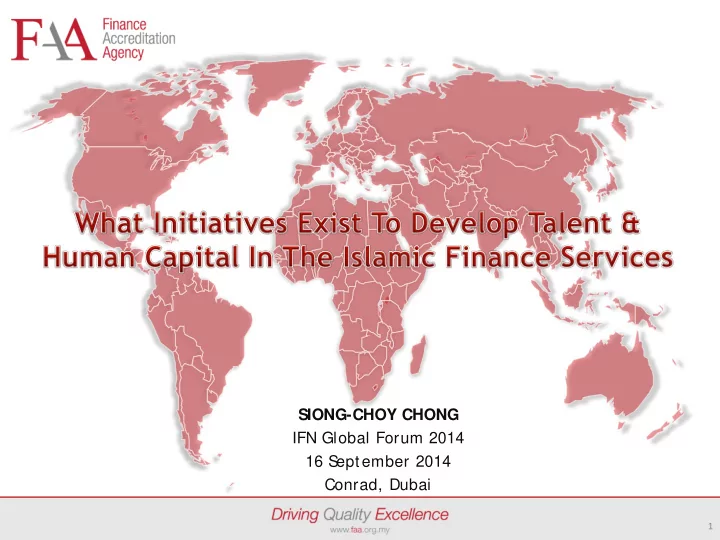

SIONG-CHOY CHONG IFN Global Forum 2014 16 S eptember 2014 Conrad, Dubai 1
Outline A Industry Overview of Islamic Finance B Education & Training Services – Industry Facts & Trends C Assuring Quality of Human Capital in the IFSI 2
Islamic Finance 2013 Review Global Islamic Finance Asset by Segment (2013E) Takaful Islamic Fund unds Sukuk kuk Banking Source: KFH Research, Islamic Finance Outlook 2014 3
Talent Shortage in the IFSI No. of people currently working 01 in the IFSI is insufficient 80 % Practitioners without a formal 02 qualification are less capable of doing their job 75 % Conventional bankers need 03 specific training before they can perform an Islamic 72 % finance-related role Lack of Shariah expertise, Islamic Finance Knowledge 04 & Practical Experience 69 % Believe that technical knowledge of Management 05 is only average 50 % Source: FAA-IFN Human Capital Development Survey: FEB 2014. 4
Shortage of Islamic Finance Professionals by Sector Shortage of Islamic Finance Professionals by Sector 50% 63% 63% 88% Source : Report of the Islamic Finance Task Force of the COMCEC Capital Market Regulator 2013 5
Issues & Challenges in Developing Human Resources in Islamic Finance 6
Source of Reference for Learning Programme Standards in Islamic Finance In House team/Colleagues Not Sure Industry Associations/ Academic Institutions Central Banks/ Regulatory Authorities/ Shariah Board No one Source: FAA-IFN Human Capital Development Survey: FEB 2014. 7
Industry ’ s Opinion on Accreditation 80% agree that they 80% think that would be more likely accreditation will to send delegates to a ensure a high quality training programme if learning programme it was accredited 83% believe that 69% believe international professional recognition accreditation (through accreditation) guarantees quality would help meet expectations Source: FAA-IFN Human Capital Development Survey: FEB 2014. 8
Integrated and Coordinated Approach to Global Quality of Islamic Finance Talent Development Global Quality of Islamic Finance Talent Well-established Quality Assurance Framework Well defined Finance Qualification Structure Institutions of Higher Learning (IHLs) & Industry Partnership Professional Standards International Connectivity & Recognition Talent Development Policies & Incentives 9
FA’s Mandate Driving Quality Development of Excellence in Learning Integrated Quality Programme Design, Assurance Framework Development & & Standards Delivery 01 02 DESIRED Learning Quality 04 03 Promoting Future Global Recognition of Practices in Talent Learning Programmes Development in the FSI 10
Driving Quality Excellence Finance Harmonisation & Qualification FAA Learning integration of Structure Criteria qualifications 6 Dimensions Credit gained process-driven QA through working & learning 9 pillars comprehensive QA FAA Recognition framework 11 steps content- of Learning driven QA FAA Learning Standards Qualification Framework 11
Conclusion Quality of Talent is critical to the development of the Islamic Finance Industry. This can be achieved through Strong concentrated harmonisation of effort between learning standards 1 education providers across IFSIs according 2 and industry players to internationally in improving training benchmarked and learning to meet industry requirement. expectation of the . industry is essential. 12
Thank You faa.org.my
Recommend
More recommend